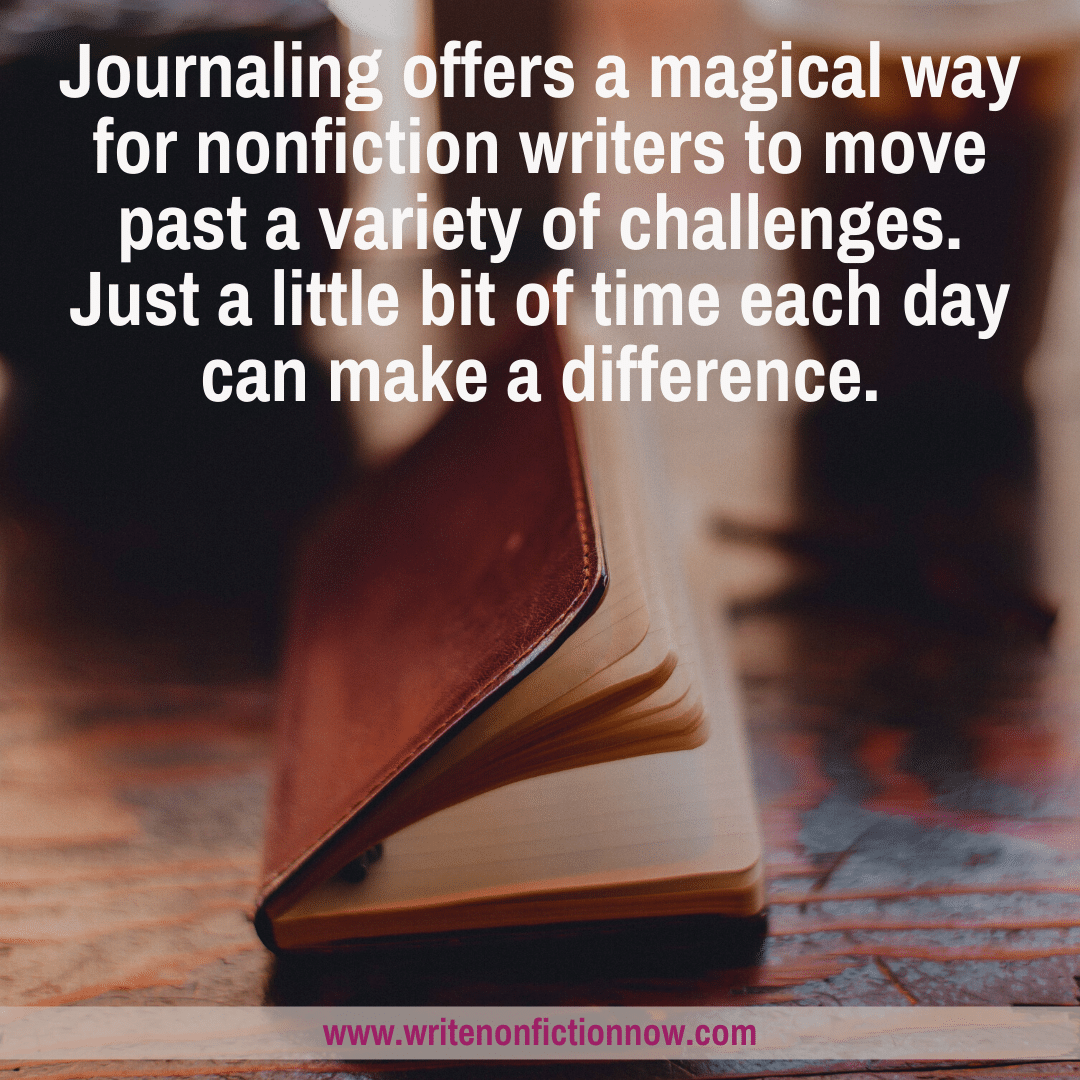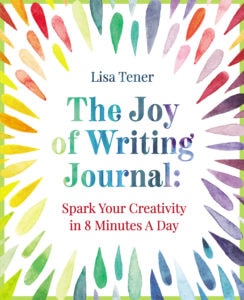As nonfiction writers, we often seek that magic habit, ritual, or tool to make our finished work potent and get the writing to flow with ease. Seek no more. Try journaling.
You’ve probably journaled before, but you may not have leveraged your journaling or made it your writer’s ally. In fact, journaling can help you remove some of your biggest challenges as a writer.
For instance, do any of these personal challenges sound familiar?
Or do you have some of these specific writing-related challenges?
- Accessing the creative muse on demand
- Stimulating your memory for sharper detail
- Drawing from a deeper well to write your best stuff
- Getting started on a new project
You can use journaling to overcome these challenges. Let me explain…
1. Making Time
Who has time for one more thing, am I right? Yet, journaling can actually save you time—all that time spent staring at a blank page waiting for inspiration to flow or trying to conjure up the memories for your memoir. Plus, by journaling before writing, you get any blocks out of the way before you begin so that your work flows with ease and speed.
2. Writing Consistently
Even if you know journaling can save you time, you must make the time to journal. For some aspiring writers, that’s the biggest hurdle, especially if they want to write consistently rather than sporadically.
I don’t believe you have to write every day to be a writer. However, I do know that consistency helps you complete your work.
So, how do you make time and write consistently?
First, decide that journaling is a priority for you. Remind yourself why you want to journal, and it will be easier to make time and stick with it.
Second, try journaling first thing in the morning. Have your journal by your bed and, while you’re still in that numinous space between sleep and waking, grab the journal and record any dreams you remember. Explore those dreams if you feel so moved. Then move on to other journaling—work through a prompts journal or explore current challenges, emotions, or areas of interest.
3. Feeling Confident About Your Writing
Because journaling is private, it takes the pressure off writing. It gives you freedom. And when you feel free, it’s harder for the inner critic to stop or shame you.
As you journal, your confidence will naturally grow. Of course, you probably won’t love everything you write, but I wouldn’t be surprised if you find a few gems every week.
To use journaling to grow your confidence as a writer, allow yourself to experiment freely. Try to avoid judging your writing, but look at your journal later for phrases or insights that delight you.
4. Starting New Projects with Less Resistance
Often, it’s challenging to start a new project. For example, you may not be sure which project of several you wish to pursue. Or you may feel some resistance and even fear around sitting down to write. Journaling can help you explore various projects, as well as your internal resistance.
By journaling before working on a new project, you can explore your different ideas and clarify which one you want to take on next. You also can write without the pressure to produce something meant for publication. In addition, you can journal about where to start!
Once you have clarity or have gotten warmed up, you can naturally transition to the work itself.
5. Accessing the Creative Muse on Demand
Most, if not all, writers experience times when it feels hard to write. Yet, journaling briefly, just 8 minutes a day, for example, will help you get over any initial inertia and write anyway.
In addition, your relationship with your creative source is like any other relationship. If you nurture the relationship with attention, it will grow, and you will receive more from it.
To access your muse (creative source) on demand, journal regularly. Ask your muse what it wants from you at the moment. Ask how you can nurture it. Or write an imagined dialogue between you and your muse. In addition to nurturing your creativity, some of your best ideas may come from these explorations.
6. Stimulating Your Memory for Sharper Detail
By journaling about your experiences, you naturally will exercise your memory muscles. As a result, your powers of observation will increase.
Journal often about everyday experiences. When you journal, try to include details from all five—or six—senses. If you notice that you’re short on one or two senses, try to observe details with those missing senses throughout your day. This will enhance your ability to recall with them, too.
As you become a more astute observer, your other writing, beyond just journaling, will also become more alive and compelling. Plus, you’ll have journals full of details that you can utilize in your nonfiction writing, including your book,
7. Drawing from a Deeper Well to Produce Your Best Work
Journaling invites you to take risks on the page, experiment, and dive deeply into your inner world. When you do that inner work, it frees you up to take more risks and immerse your entire self in your writing projects as well.
To use journaling to write deeply, investigate themes, material, and forms you might not usually employ. Explore the seemingly challenging material—ancestral history, a scary dream, difficult relationships.
And keep going. Don’t stop at what you know about the situation, relationship, person, or yourself. Instead, keep writing to access the things you didn’t know. After taking such risks in your journal, it will be natural to do so in your nonfiction writing.
Plus, you can use material from your journal and employ it in a book, article, essay, blog post, or another format.
Journaling can help your nonfiction writing in numerous magical ways. And it takes so little time to see the benefits.
If you journal regularly, how has it helped your nonfiction writing? Tell me in a comment below. And please share this post with another writer.
About the Author
 Lisa Tener is an award-winning book coach, speaker, and author of the bestselling book The Joy of Writing Journal: Spark Your Creativity in 8 Minutes a Day. Lisa has helped thousands of aspiring writers and authors access their creativity, find their voice and write and publish groundbreaking books through her coaching services and courses. For over a decade, Lisa served on the faculty of Harvard Medical School’s CME publishing course, helping doctors, therapists, and other healing professionals bring their books to life. Lisa is now on a mission to share her passion for journaling with writers and others. Find out more at LisaTener.com. You can join Lisa for the free October Journaling Adventure here.
Lisa Tener is an award-winning book coach, speaker, and author of the bestselling book The Joy of Writing Journal: Spark Your Creativity in 8 Minutes a Day. Lisa has helped thousands of aspiring writers and authors access their creativity, find their voice and write and publish groundbreaking books through her coaching services and courses. For over a decade, Lisa served on the faculty of Harvard Medical School’s CME publishing course, helping doctors, therapists, and other healing professionals bring their books to life. Lisa is now on a mission to share her passion for journaling with writers and others. Find out more at LisaTener.com. You can join Lisa for the free October Journaling Adventure here.
 Would you like to write and publish nonfiction work, like articles, blog posts, books, or reports…and become a successful author? Join the Nonfiction Writers’ University. Get the basic education you need and the Author Coaching to help you succeed as a nonfiction writer. Enjoy a 30-day trial membership for only $1. If you’ve felt the desire to get coached and be supported as you pursue authorship, this program is for you. Participate in monthly group Author Coaching sessions and gain access to an extensive archive of writing and publishing resources.
Would you like to write and publish nonfiction work, like articles, blog posts, books, or reports…and become a successful author? Join the Nonfiction Writers’ University. Get the basic education you need and the Author Coaching to help you succeed as a nonfiction writer. Enjoy a 30-day trial membership for only $1. If you’ve felt the desire to get coached and be supported as you pursue authorship, this program is for you. Participate in monthly group Author Coaching sessions and gain access to an extensive archive of writing and publishing resources.

